The Pittsburgh synagogue attack forced HIAS to evolve, says CEO Mark Hetfield. But in an era that saw the organization sue its biggest patron, the US government, that’s nothing new
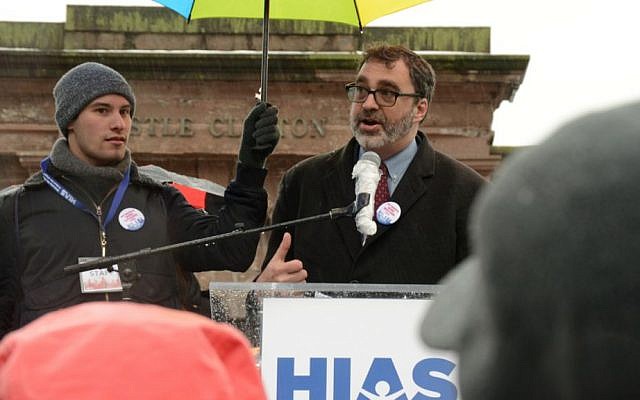
WASHINGTON — October 27, 2018 was an inflection point for the entire United States Jewish community. It marks the deadliest anti-Semitic attack on American soil, in which a gunman entered Pittsburgh’s Tree of Life synagogue on a Sabbath morning and killed 11 worshipers.
But for Mark Hetfield, the president and CEO of HIAS, there was an added dimension.
The alleged shooter Robert Bowers posted on social media just before the attack. “HIAS likes to bring invaders in that kill our people. I can’t sit by and watch my people get slaughtered. Screw your optics, I’m going in,” he wrote, according to the Associated Press.
The haunting high-profile incident has changed the Jewish nonprofit in profound ways: It has unsurprisingly been forced to take unprecedented security measures. But the organization has also had to explain the evolution of its institutional calling.
Founded in 1881, HIAS (formerly called the Hebrew Immigrant Aid Society) was designed to help Jewish refugees resettle. That work became intensified after the Holocaust and after the fall of the USSR. But with the decline of Jewish refugees in the 21st century and the recent global refugee crisis emanating from the Syrian Civil War, the group’s work has changed.
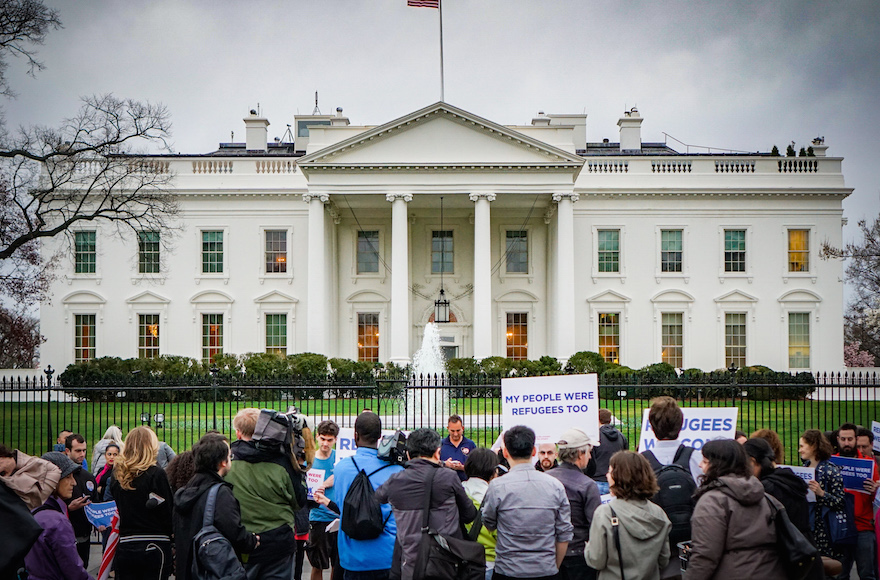
“We no longer seek to help refugees because they are Jews, we seek to help refugees because we are Jews,” Hetfield told The Times of Israel last week.
Below is an edited and condensed conversation in which Hetfield discussed the ways HIAS has been affected as an organization by US President Donald Trump’s anti-refugee policies, such as the travel ban, as well as the fallout from the Pittsburgh synagogue shooting last October.
How have things changed for HIAS as an organization over the last two years?
It’s been like drinking from the firehose, frankly. But the philosophical mission and the evolution of our organization has been the same since the early 2000s: We no longer seek to help refugees because they are Jews, we seek to help refugees because we are Jews.
But over the Trump years we’ve had to respond to the refugee Muslim ban and bring litigation against our largest funder and partner [the United States government]. That certainly created a lot of reverberations around the agency. That was a big risk that we felt we had to take. Now we’ve been struggling with keeping resettlement going, without much support from our biggest partner, and also addressing the refugee crisis we have in this hemisphere. It has been constant change and crisis.
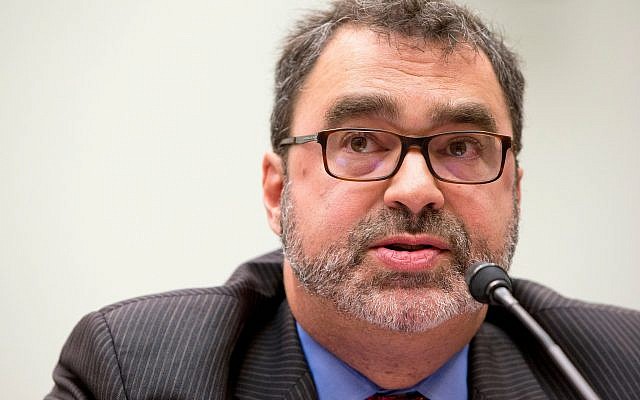
When the Syrian boy Alayn Kurdi washed ashore the beaches of Turkey in 2015, it was a huge story and all of a sudden the refugee crisis was getting lots of attention. Refugee agencies got massive boosts in funding for about a week. And then, all that funding dried up. Are the Trump administration’s anti-refugee stances causing a more sustained interest in this issue?
We were afraid it might be the same thing — that the refugee crisis might just be the humanitarian crisis of the month. But we have enjoyed a trajectory of support — not just financial support, but in terms of advocacy and followers on social media — since that time. It has maybe not been a steady trajectory, but it has been growth without any steps backward.
People have really stayed engaged in this issue — through the campaign, the election, the refugee and Muslim ban, and through the Pittsburgh massacre. The ironic thing is that even though we feel more vulnerable than ever in terms of the support of our US government partner, we actually feel stronger than ever because we have so much community support. Our donor base has grown by many tens of thousands.
On the advocacy front, what are you guys pushing for right now on Capitol Hill and maybe elsewhere in Washington?
There has been a real effort by the administration to dismantle the structures that were put in place in the years and decades following the Second World War to protect refugees, to make sure that never again would people be trapped inside a genocide.
There has been a real effort by the administration to dismantle the structures that were put in place in the years and decades following the Second World War to protect refugees
The administration has told us and other agencies to close resettlement sites; they’ve put the national resettlement agencies on notice that they are going to reduce the number of agencies they partner with, from the nine that it’s been since 1980; they’ve tried to impose a moratorium on refugee resettlements; they are trying to roll back basic asylum provisions with the “remain in Mexico” initiative that they are pursuing; they’re trying to dismantle the refugee department at the State Department. These are the things we’ve been fighting against for the last two years.
Tell me about the Pittsburgh shooting. What was it like for you that day? Obviously, there was the shock that it happened, period. But what about learning that the shooter had been ranting about HIASon his social media accounts before carrying out the attack?
I was actually at a bar mitzvah at Adas Israel [the largest Conservative movement-affiliated synagogue in Washington]. I was pulled out of it because my phone kept vibrating. I was ignoring it but finally I took the call. We had actually learned from CNN that HIAS had been implicated in the attack by the terrorist.
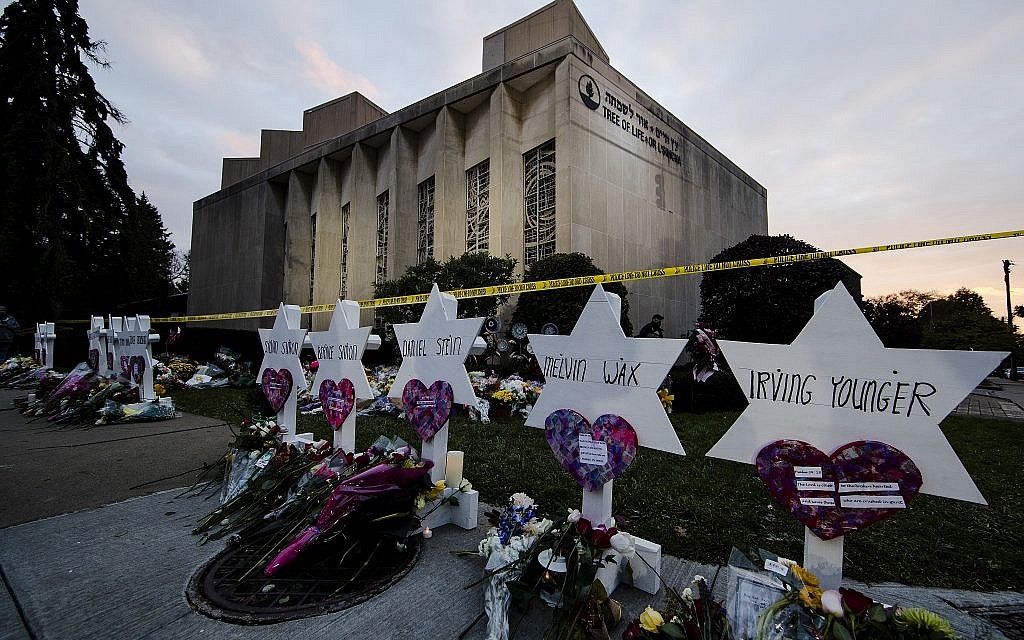
How did it affect HIAS institutionally?
For one thing, we’d always taken pride that we didn’t have to take security measures that other Jewish organizations had to take. We were a refugee resettlement and protection organization that did not seem controversial, so our offices were like any other nonprofit. But now, we’ve had to become as security conscious as any Jewish organization, or perhaps even more so. That totally has changed the culture of the organization.
And we deal with clients who see that type of security and don’t necessarily calm down, especially after what they’ve been through. The clients that we serve who escaped prosecution and torture.
It’s been really difficult, and there’s no turning back on that. There was a lot of hateful noise against HIAS the last few years on the web, on social media. We just ignored it and tuned it out, but now we’ve realized we can’t do that anymore.
Have you thought about what policy reversals and new policies you will be advocating if and when there’s a new administration that isn’t hostile to refugees?
Absolutely, the United States has to resume its position of leadership in refugee protection. The rest of the world looks at what we do, and they do emulate it.
We have to strengthen our asylum laws so that people who need protection get it quickly, and so people who don’t are also dealt with quickly. Even that isn’t happening now. We have to increase our refugee resettlement numbers, which are now at a record low. And they should be at a record high, because the needs are greater they’ve been since the start of the refugee program in 1980.
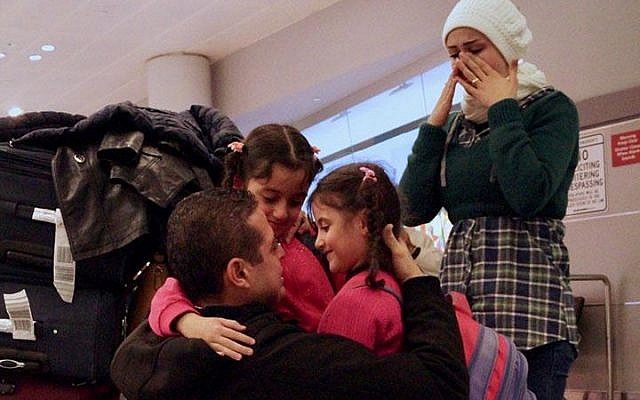
We need to depoliticize the issue and make it bipartisan again. The Trump administration has really been an anomaly in terms of refugees. This has traditionally not been a Democratic or Republican issue, but it’s become one. To be fair, though, that trend started before nomination and election. That [Republican antagonism to refugees] was evident throughout the primary campaign, especially when the 31 governors — 30 of whom were Republicans — said Syrian refugees would not be allowed to be resettled in their states.
What do you tell people when you want them to understand how important this is?
It’s important to understand that the entire regime to protect refugees internationally was set up out of the ashes of the Holocaust — to make sure that never again would people be trapped inside of a genocide. That’s why Jews have a special obligation to protect these structures, to protect a multilateral approach to welcoming refugees.
We do feel we’ve been getting that support from the Jewish community. This has been a priority. So that’s the silver lining over this very dark cloud that’s been hanging over us and over refugees for the last few years.
As reported by The Times of Israel
